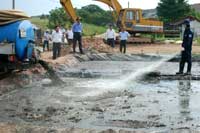
| Garbage-fee probe may attract investors | |
The HCM City’s People’s Committee has asked the Department of Natural Resources and Environment to work with other agencies to develop a detailed price list of household waste treatment fees so that new regulations on the fees can be created. The department will examine the fee structure of the city’s three waste treatment facilities based on several factors, including the kind of technology used and the initial investment made in each facility. The aim is to develop a city regulation that will outline clearly the range of fees that can be charged by each treatment facility. The City People’s Committee believes that a more transparent price structure will make it easier to attract foreign companies to invest in building waste treatment plants. Since 2006, the department has sought investment for construction of waste treatment plants. The three solid waste treatment complexes currently operating in HCM City are Tay Bac – Cu Chi, Thu Thua – Long An and Da Phuoc – Binh Chanh. Within one year, however, their capacity to treat the city’s household waste will be insufficient. Recently, Vietstar and Thanh Cong companies have each built a waste treatment facility, both of which have begun to treat household waste. These two plants, along with the three existing treatment facilities, will satisfy the city’s household waste treatment demands until 2016, according to the department. After that, the city will need more treatment facilities to accommodate demand. The cost of treating household waste varies, depending on whether it is buried, burned or composted, and the kind of technology used. Fees range between US$5 and $10 per tonne. It is estimated that 7,000 tonnes of household waste are produced every day in HCM City. The amount could rise to 16,000 tonnes per day between 2011 and 2020. | |
| VietNamNet + Viet Nam News |
